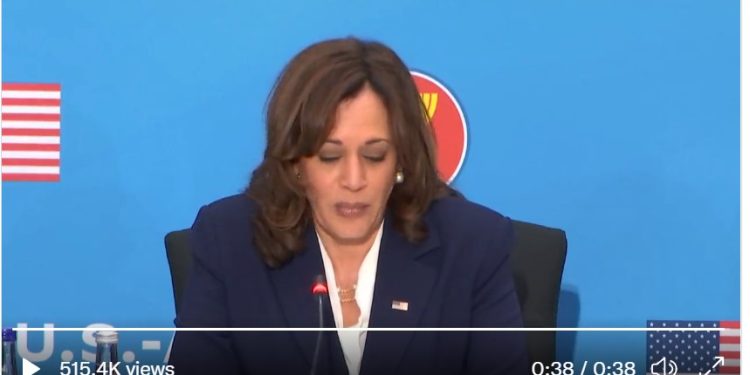This is horrifying. The first ‘African American’ Female Veep from Jamacia has prattled on – on the world stage, embarrassing herself and the United States of America, again.
Apparently, Democrat Kamala Harris is not cable of organizing her own thoughts, and neither is her prompter, as there is absolutely no pre-planning before delivering comments to the world on essential matters that concern people- because why should elites do any work? Why should they- that is for the little people, right?
It is important to note that the comments were made to soothe the Asain community, who feel that the Biden administration is not paying enough attention to them. See if you find her comforting.
Isn’t Kamala the choice- the hand-picked successor- of the amazing and incredible magical orator, Barack H. Obama?
How should Obama explain this mess:
Kamala Harris to world leaders at ASEAN Summit: “we will work together, and will continue to work together, to address these issues, to tackle these challenges, and to work together as we continue to work…”
Kamala Harris to world leaders at ASEAN Summit: "we will work together, and will continue to work together, to address these issues, to tackle these challenges, and to work together as we continue to work…" pic.twitter.com/nRiDS9UkzS
— POLARIS (@polarisnatsec) May 15, 2022
The ASEAN Summit is a biannual meeting held by the members of the Association of Southeast Asian Nations in relation to the economic, political, security, and socio-cultural development of Southeast Asian countries.
Kamala’s comments make Joe Biden look like a genius. Here is the backstory of where these comments happens, as reported by CNBC.
Biden hosts Southeast Asian leaders at the White House today. Here’s what to expect
-International security matters will be discussed at the summit, says former ASEAN secretary-general Ong Keng Yong.
-The Southeast Asian bloc would like to see an economic framework with some concessions and a clearer strategy toward regional security, especially involving the South China Sea,” says an analyst.
-ASEAN’s “centrality” to the US Indo-Pacific strategy gives the grouping some leverage.
In the midst of the Ukraine war which is Washington’s top foreign policy priority, President Joe Biden is hosting Southeast Asian leaders in Washington — signaling U.S. commitment to the region where it is engaged in a tussle for dominance with China.
Some critical issues — like the post-Covid economic revival, climate change and the Myanmar coup — will be on the table at the two-day meeting starting Thursday. Leaders from the Association of Southeast Asian Nations (ASEAN), a bloc of 10 countries that together make up the world’s seventh-largest economy, will be there.
“It is unavoidable that geopolitics and international security matters will be raised and discussed, but in this respect, I do not expect any dramatic moves,” said Ong, adding: “There’s a need for the U.S. to be more present in Southeast Asian countries.”
The White House has said the summit would “demonstrate the United States’ enduring commitment to ASEAN, … and commemorate 45 years of U.S.-ASEAN relations.”
The U.S. has often stressed the “centrality of ASEAN” to its Indo Pacific strategy to contain China. This emphasis provides the region — populated by nations unwilling to openly choose between the U.S. and China — with some bargaining power.
Security issues will likely be on the table at the summit, Ong Keng Yong, former secretary-general of ASEAN, told CNBC.
Ong, who is also Singapore’s ambassador-at-large, said Asia offered enough to keep the U.S. engaged despite its pre-occupation with the war in Ukraine. “Since the end of the Second World War, it is obvious that Europe comes first to the U.S. before any other region of the world,” he said.
“Nevertheless, the people of ASEAN believe that American resilience and vitality will find the Asian side of the Pacific Ocean something worthwhile to engage with and to secure U.S. prosperity going into the future.”
“ASEAN would like to see an economic framework with some concessions and a clearer strategy toward regional security, especially involving the South China Sea,” a senior fellow for Southeast Asia at the Council on Foreign Relations, Joshua Kurlantzick, told CNBC.











